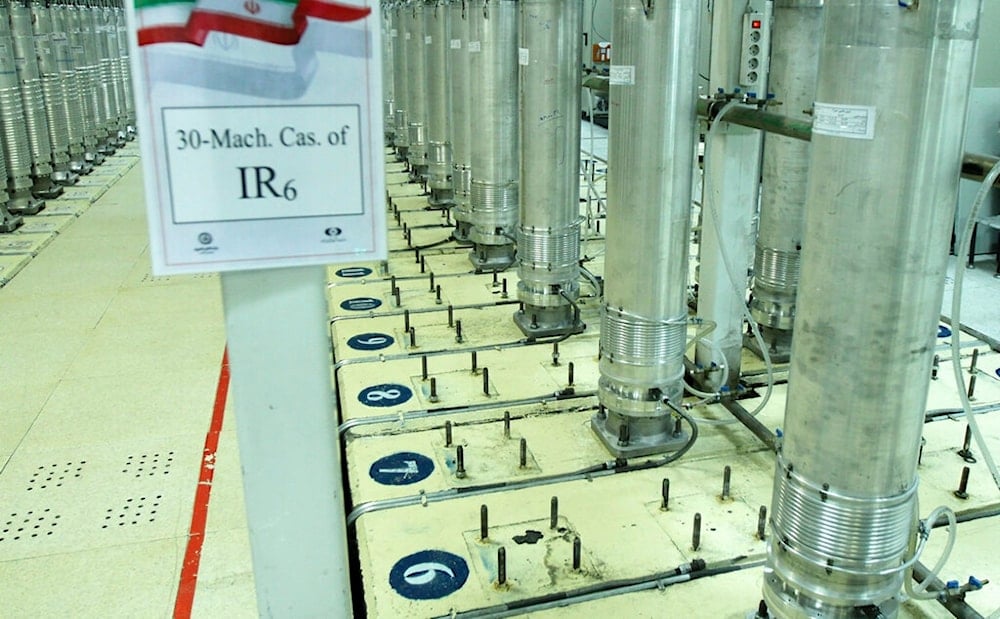Head of Iran's atomic agency orders activation of new centrifuges
Mohammad Eslami has directed the activation of new nuclear equipment in response to a US-UK-France-Germany-backed IAEA resolution against Iran.
-

Centrifuge machines in the Natanz uranium enrichment facility in central Iran are seen in a photo released on November 5, 2019, by the Atomic Energy Organization of Iran (AP)
The head of Iran's Atomic Energy Organization, Mohammad Eslami, has directed the activation of a new and advanced series of centrifuges in response to the resolution adopted by the International Atomic Energy Agency (IAEA), which criticized Tehran for what it described as a lack of cooperation.
In a joint statement with Iran's Ministry of Foreign Affairs, the Atomic Energy Organization of Iran (AEOI) stated that the decision by the IAEA Board of Governors was made under pressure from the European Troika, which includes Britain, Germany, and France, and the United States, describing this approach as "destructive."
Both the ministry and the agency emphasized that such a destructive approach would negatively impact the positive atmosphere between Iran and the IAEA, as well as the understandings achieved between the two sides.
"It is clear, these measures are being taken in order to protect the country's interests and further develop the peaceful nuclear industry, in line with the growing national needs and within the framework of Iran's rights and obligations under the Comprehensive Safeguards Agreement," the statement pointed out regarding Eslami's decision.
At the same time, the joint statement affirmed that "technical and safeguards cooperation with the IAEA will continue, as in the past, within the framework of the Safeguards Agreement."
It added that "Iran remains ready for constructive engagement with relevant parties based on international legal principles and standards," stressing that "the principled policy of protecting the rights and interests of the great Iranian nation and developing a peaceful and indigenous nuclear program will continue with seriousness."
The IAEA resolution, introduced by Britain, France, Germany, and the United States to the agency’s 35-nation board, follows a similar measure passed in June.
China, Russia, and Burkina Faso opposed the motion, which was adopted with 19 votes in favor, 12 abstentions, and Venezuela abstaining from participation, according to two diplomats who spoke to AFP.
The confidential resolution, reviewed by AFP, emphasizes the "essential and urgent" need for Iran to "act to fulfill its legal obligations."
It also urges Tehran to provide "technically credible explanations" regarding uranium particles allegedly detected at two undeclared sites within the country.
Additionally, Western powers have called for the IAEA to issue a "comprehensive report" on Iran's nuclear activities by no later than spring 2025.
On Wednesday, Al Mayadeen obtained a copy of the draft resolution submitted by France, Britain, Germany, and the United States concerning Iran. The draft’s seven clauses indicate that Western countries aim to revive the 2015 nuclear deal with Iran, which the United States withdrew from, under President-elect Donald Trump in 2018.
Iran warned of immediate and decisive action if the resolution was adopted. It affirmed that the AEOI is "prepared to implement its response decision upon approval," clarifying that this move is a reaction to the "unconstructive approach of these countries and their disregard for Tehran's goodwill."
In an interview with Al Mayadeen, Iranian Foreign Minister Abbas Araghchi emphasized that the Islamic Republic would take appropriate countermeasures, stating, "We have a genuine will to cooperate with the agency and resolve outstanding issues, but the European action contradicts this direction."
Iranian sources also confirmed to Al Mayadeen that Tehran "will immediately respond in the nuclear field if the IAEA Board of Governors issues a statement against it."

 4 Min Read
4 Min Read








